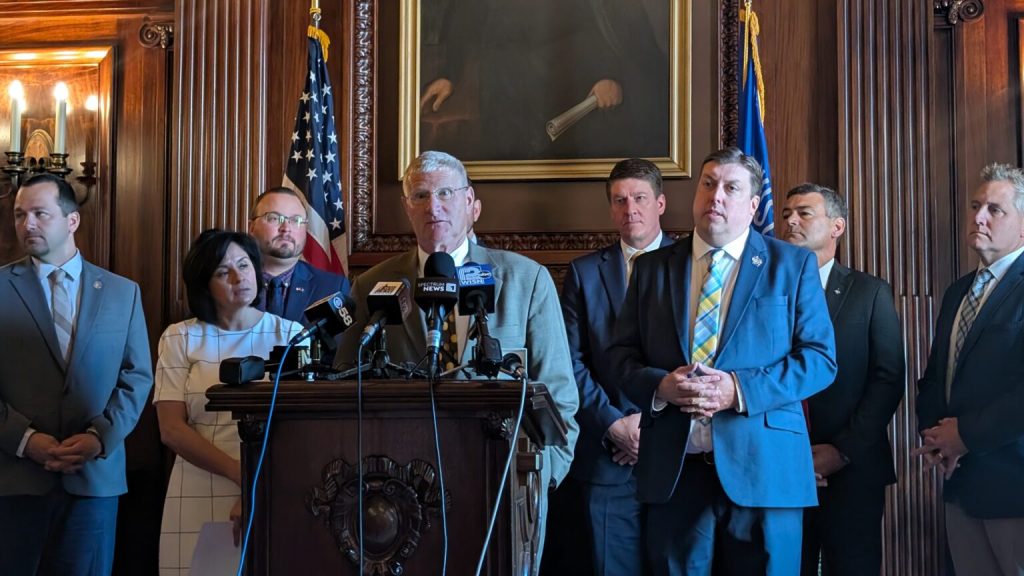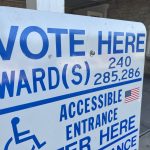Bipartisan Budget Deal Gets Mixed Reviews From Wisconsin Legislators
A 'step in the right direction' or a 'little sad' and 'unacceptable'?

“This budget has involved an awful lot of compromise, both between the houses as well as with the governor’s office,” Joint Finance Committee Co-chair Sen. Howard Marklein (R-Spring Green) said at a press conference ahead of the meeting. “A budget is a compromise and this budget is certainly one of those.” (Photo by Baylor Spears/Wisconsin Examiner)
The Wisconsin Joint Finance Committee advanced the budget deal announced by lawmakers and Gov. Tony Evers Tuesday, with the full Senate and Assembly scheduled to take up the budget Wednesday. The committee also passed a $2.5 billion plan for capital projects, which included a measure to start work on a project that will allow for the closure of the Green Bay Correctional Institution by 2029.
The agreement announced Tuesday morning was negotiated by Evers, Assembly Speaker Robin Vos, Senate Majority Leader Devin LeMahieu (R-Oostburg) and Senate Minority Leader Dianne Hesselbein over the last several months and will invest over $1 billion in education and child care and cut taxes by about $1.3 billion. The deal also includes funding plans for the Department of Transportation, including funding for roads, and changes to the state’s hospital assessment to help cover Medicaid costs.
The committee’s action comes a day after the end of Wisconsin’s fiscal year. Wisconsin’s government continues to run under the current budget until a new one is signed into law.
Legislators on both sides of the aisle had similar reactions saying the deal did not contain everything they wanted with some signaling support for the bill and others saying they will vote against it.
“This budget has involved an awful lot of compromise, both between the houses as well as with the governor’s office,” Joint Finance Committee Co-chair Sen. Howard Marklein (R-Spring Green) said at a press conference ahead of the meeting. “A budget is a compromise and this budget is certainly one of those.”
The committee voted 13-3 with Sen. LaTonya Johnson (D-Milwaukee) joining Republicans in favor of approving the deal. It also voted 12-4 along party lines to approve the entire budget bill to advance it to the Senate and Assembly floor.
Capital budget includes plan to close Green Bay prison
The over $2.5 billion capital budget plan grants funding for projects at the UW system, within the Department of Corrections, Department of Health Services, Department of Military Affairs and the Department of Natural Resources.
Over $480 million — or about 18% — of the capital projects plan is for projects at campuses across the UW system and was negotiated as part of the budget deal.
The plan also includes $225 million for the Department of Corrections, including $15 million for construction project planning for realignment of facilities and the closure of Green Bay Correctional Institution (GBCI) by 2029.
Marklein said lawmakers were investing across Wisconsin and the DOC plans would help to start to “right-size” the state’s corrections system.
As the state has faced a growing prison population and aging facilities, Evers had proposed a DOC capital budget of over $630 million that included renovating Waupun Correctional Institution and making it a “vocational village” as well as several other prisons. The plan culminates in the closure of the Green Bay facility. GBCI, which was originally opened in 1898, is one of the state’s oldest facilities and houses 381 more people than its intended capacity.
Lawmakers have been interested in closing GBCI for years, but were skeptical of Evers’ plan to make that happen.
Co-chair Rep. Mark Born (R-Beaver Dam) signaled that the action in the budget is just the beginning of a years-long process.
“I think that this stuff will all be figured out over several budgets,” Born said in response to questions about the capacity of the state’s prison and Waupun. “These fiscal capital projects don’t happen in two years, and they won’t in this case, either.”
Lawmakers who represent parts of the Green Bay area said the inclusion of the GBCI closure date in the budget is a major step forward.
“Formalizing a decommissioning date into state law will ensure decisive action is taken to solve this long-standing issue and prevent the bureaucratic delays which have plagued this situation for far too long,” Rep. Benjamin Franklin (R-De Pere) said.
Rep. David Steffen (R-Howard) called GBCI “unsafe, unstable and unsustainable” and said he is thankful for the step forward.
Alluding to Evers’ plan, Rep. Tip McGuire (D-Kenosha), meanwhile, said there is a plan that lawmakers could have moved forward. He said the item in the budget seemed like a plan that was “kicking the can down the road.”
The budget deal also includes $130 million for a Type 1 juvenile facility in Dane County. The planned 32-bed facility is the second one meant to replace youth prisons Lincoln Hills and Copper Lake — old facilities initially scheduled to close by 2021. The Department of Administration has estimated that with full funding ($124 million in bonding authority) the project could be completed by 2029.
Lawmakers, advocates have mixed reaction to deal on K-12, higher education and child care
Evers repeatedly said investing in Wisconsin’s K-12 and higher education systems as well as child care were his top priorities. Republican lawmakers said they were opposed to continuing state payments to child care facilities, supported cutting the UW budget and only supported incremental increases for the state’s public schools. The deal includes investment in each area.
Several Democratic lawmakers, nonetheless, had mixed feelings about the concessions Evers and Senate Minority Leader Dianne Hesselbein (D-Middleton) got from the majority party. During committee, Democrats proposed investing over $500 million in the UW system, $200 million in child care grants and expanding postpartum Medicaid coverage, though Republicans rejected those ideas.
Under the deal, the University of Wisconsin system will get a $250 million increase, according to Evers’ office. The motion approved by the committee includes investments for general program operations, mental health, staff recruitment and retention and $94 million for staff wage adjustments.
The increase comes despite threats from Republican legislators to cut the UW system by tens of millions and as federal uncertainty, which has led some campuses to tell departments to prepare cuts
Sen. Kelda Roys (D-Madison) said lawmakers were short-changing the UW system, despite it contributing heavily to the state’s economic successes.
“What they are getting is about 5% of what they said that they needed,” Roys said. Evers and the system proposed an $855 million budget increase over the biennium. “We’re going to continue to see tuition hikes, we’re going to continue to see campus closures. We’re going to continue to see the doors of opportunity closing for our kids here in Wisconsin, and they’re going to have to go out of state or go without access to higher education and I think that’s wrong.”
Roys voted against the budget in committee, saying it would have needed to do more for the state’s kids to get her vote. “Ultimately, I want a Wisconsin, where every child, no matter who you are or where you’re from, have the opportunity to thrive,” Roys told reporters.
Stakeholders in the UW system also reacted to the budget deal on Tuesday.
UW President Jay Rothman said on social media he is grateful for the support of Evers and the Legislature.
“Today’s budget agreement marks the largest overall increase in investment in the UWs over two decades. For generations, Wisconsinites have invested in the UWs to provide affordable and accessible higher education. They should take great pride in what Wisconsin has built,” Rothman said. “With these new investments, the UWs can do more to provide the educational opportunities students deserve and parents expect.”
Public Representation Organization of the Faculty Senate (PROFS), the nonprofit organization of UW-Madison faculty, said it was “heartened” by the funding increase but worried about some of the concessions that Republican lawmakers got.
“We are concerned, however, that the agreement between Republican legislative leaders and the governor includes teaching-load requirements for faculty and instructional staff, which has always been the purview of the universities themselves, not the Legislature,” the organization stated.
Under the agreement, faculty will be required to teach no fewer than 24 credits per academic year. The UW Board of Regents will have to develop a buyout policy for positions not meeting the minimum credit requirements. The budget will also include a similar policy for the Wisconsin Technical College System.
The UW portions of the agreement will also include a cap on the number of positions that the system can have funded through general purpose revenue and program revenue and no institution will be allowed to designate more than 10% of its faculty and 10% of its academic staff to administrative duties.
Born said it was part of the compromise that Assembly Republicans made.
“It is a positive number, and most of our caucus on the Assembly side… is not happy about that because they know that there are major problems in that system that need work,” Born said. “We worked through that compromise and gave them $50 million as opposed to $800 million… to get some of those reforms.”
Child care providers will get a $330 million investment under the deal, including direct payments to continue once the Child Care Counts program lapses. A “Bridge” program will provide $110 million to help child care facilities stay open, though it will only last for a year. It also includes funding to kickstart a state-funded child care program targeted at supporting facilities serving 4-year-olds.
“The reality is this is a small amount of money in terms of the need, and it is only for year one, so all that’s happening here is we’re kicking the can down the road on massive child care closures a year from now… I don’t count that as a huge victory,” Roys said. “To get that money there have been agreements to functionally deregulate child care, to increase ratios, to make it less safe to take away the important protections.”
Sen. Patrick Testin (R-Stevens Point), who said he plans to vote for the budget on the floor, said the investment would help make child care in the state more affordable and increase access.
“While it’s not perfect, this is where we’re at with divided government,” Testin said “Maybe it’s not as far as some would like but it’s a step in the right direction.”
Funding for K-12 education will increase the special education reimbursement rate to 42% in the first year of the budget and 45% in the second year. Republican lawmakers initially approved a maximum increase of 37.5%, while Evers had proposed a 60% increase.
There will be no general aid increase for public schools. School districts will only be able to increase their school revenue annually by $325 per pupil by going to local property taxpayers through the referendum process.
Rep. Tip McGuire (D-Kenosha) said it was a “little sad” Evers “had to drag the Legislature kicking and screaming to a place that is frankly insufficient for our needs.” He said the increase to special education funding likely wouldn’t end school districts’ reliance on raising revenue through property taxes increases.
Some Democratic lawmakers and advocates said Evers needed to negotiate higher increases for schools and said the lack of general aid increase in the deal is a reason to reject it.
Rep. Francesca Hong (D-Madison) said no general aid increases for Wisconsin’s public schools is “unacceptable,” calling the budget “Republican-led” and urging people to call their Democratic legislators and Evers’ office to tell them to vote against it.
“This budget fails to meet the needs of our children and working-class communities,” Hong wrote in all caps on social media. “This budget is guaranteed to raise property taxes and pit students and communities against one another.”
Sen. Chris Larson (D-Milwaukee) said he would vote “no” on the budget for similar reasons.
“The final product falls far short of what our neighbors need and frankly what they have demanded since the beginning of this process,” Larson said, noting the lack of general aid, the school revenue increase that doesn’t keep up with inflation and the special education rate. “For these reasons and many more, I will be voting ‘no,’ unless massive changes are adopted,” Larson said. “Democrats will be offering several amendments in pursuit of a budget that meets this moment.”
The Wisconsin Public Education Network sent out a similar message, and called for people to call Senate lawmakers and urge them to vote against the budget.
“The compromise on the table provides $0 (none, not one pencil’s worth) in new state aid for public schools in both years of the biennium — in exchange for a welcome but inadequate increase to the special education reimbursement rate,” the organization said. “A vote for this budget is a vote for widening our gaps. Public schools will close. We will see another two years of record rates of referenda.”
Asked about advocates’ desire to try to negotiate for a general aid increase for schools, Evers said on Tuesday that there were some policies that just weren’t going to happen. He spoke to the Wisconsin Examiner Tuesday afternoon after attending a Wisconsin Economic Development Corp. event in Middleton to announce a business expansion at Catalent, a bio-health company.
“We have the largest amount of money that we’ve ever sent to our public schools coming to them, and so I know there are people that wanted everything, and when you’re in a situation where you have Republicans and Democrats [who make up] about same size of part of the government, you’re going to you’re going to have to compromise,” Evers said. “I do wish we could have put another $5 billion into it of course, but that wasn’t going to happen.”
Democrats say new maps led to budget deal, pledge to do more in majority
The budget needs 17 votes to pass in the Senate and will likely find it from a bipartisan group of lawmakers. Marklein said he was “confident” that there would be enough votes.
Slim margins in the Senate and several Senate Republicans who said they were inclined to vote against the spending package, even ahead of the announcement of a deal, led to Democratic Minority Leader Hesselbein becoming involved in negotiations, which previously have only involved Republican legislators. Republicans have passed the budget before with only votes from their caucus, but in the Senate this year, the caucus can only afford to lose one vote.
Several Senate Democrats, including several who are serving their first term, said the budget deal was the result of new legislative maps that took effect for the first time in 2024. Under those maps, Democrats in the Senate flipped four seats, trimming the Republican majority from two-thirds to a margin of 18-15.
Freshman Sen. Sarah Keyeski (D-Lodi) said the state would be moving in the right direction with the budget agreement and Senate Democrats helped make it “palatable.”
“To be clear, this budget is not ideal, but in the spirit of bipartisanship and forward progress, I am pleased to be a part of what Senate Democrats were able to do on behalf of all Wisconsinites,” Keyeski said.
Sen. Jodi Habush Sinykin (D-Whitefish Bay) said the deal reflects “bipartisanship and progress.”
“I am proud to see it move forward,” said Habush Sinykin, who is also in her first term. “What we are seeing playing out in this budget is the consequence of Wisconsin’s new fairer maps — legislators working together to find compromise and make meaningful progress for the people of Wisconsin.”
Two other Democrats in their first term highlighted local allocations in the budget. Sen. Jamie Wall (D-Green Bay) celebrated $30 million that was included in the budget for a new railroad bridge at Red Maple Road between American Boulevard and Lost Dauphin Road in West De Pere and Sen. Kristin Dassler-Alfheim (D-Appleton) highlighted some of the items in the budget that will help her district, including the $137 million investment for UW-Oshkosh’s Polk Learning Commons.
“The new, fair maps created a balanced government, and this is the result: a government that can work together to reach an agreement where everyone walks away wishing they’d gotten more but no one leaves feeling kicked in the teeth,” Dassler-Alfheim said. “I’m hopeful that we can work together to get this over the finish line and move Wisconsin forward, together.”
Senate Democrats also said they would do more should they win a majority in future elections.
“Because of the negotiations that we had for this budget, the outcomes were a lot better than they would have been had those individuals not been at the table, had our voices not been at the table,” said Sen. LaTonya Johnson (D-Milwaukee). “And I just want to say that going forward for every budget. It should be like that, and don’t worry, when we’re in the majority, it will be like that, which will be in 2026.”
She told reporters she is leaning towards voting for the budget, but added, “we’ll have to see.”
Assembly Minority Leader Greta Neubauer (D-Racine) also said electing more Democratic legislators made a difference.
“I am thankful that Governor Evers and my Senate Democratic colleagues were at the negotiating table on our state budget and have gotten some real wins for the people of Wisconsin,” Neubauer said. “There are critical investments in education, child care and the priorities of Wisconsinites in this budget, but we also know that due to years of underfunding by the GOP majorities, there is a lot that remains to be done.”
Andraca praised the new maps in the committee meeting, saying that a nearly 50-50 split in the Senate and Assembly has spurred conversations in a new way.
“Congratulations on the bipartisanship. I think this budget does a lot of good,” Andraca said, but added, “I’m not sure it does enough to earn my vote at this time.”
‘It’s not perfect:’ Wisconsin legislators express mixed reaction to bipartisan budget deal was originally published by the Wisconsin Examiner.
If you think stories like this are important, become a member of Urban Milwaukee and help support real, independent journalism. Plus you get some cool added benefits.





















